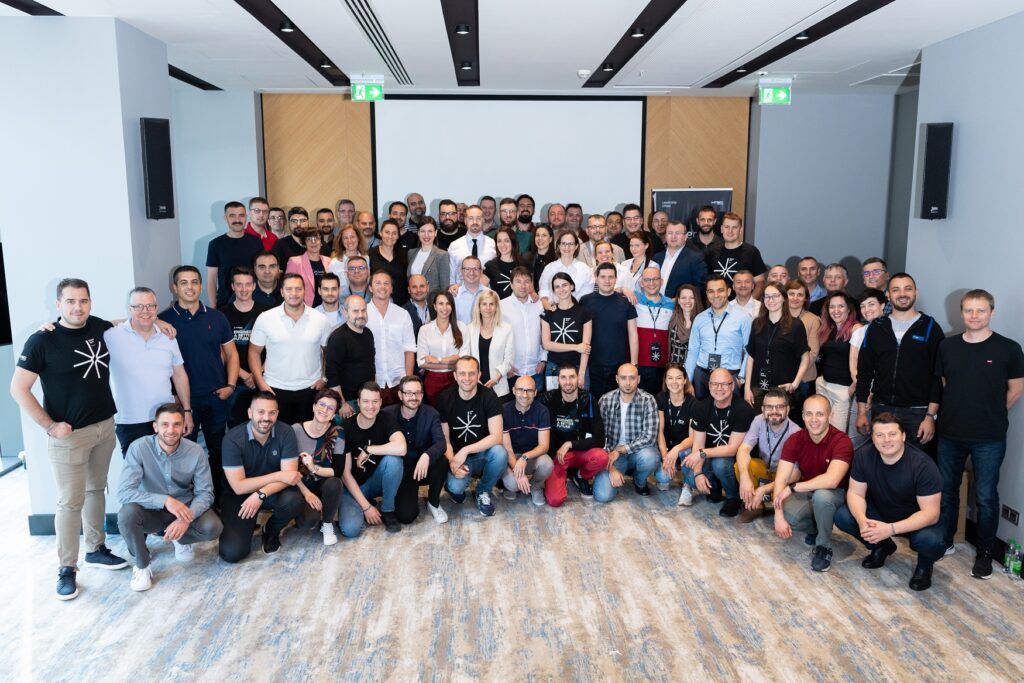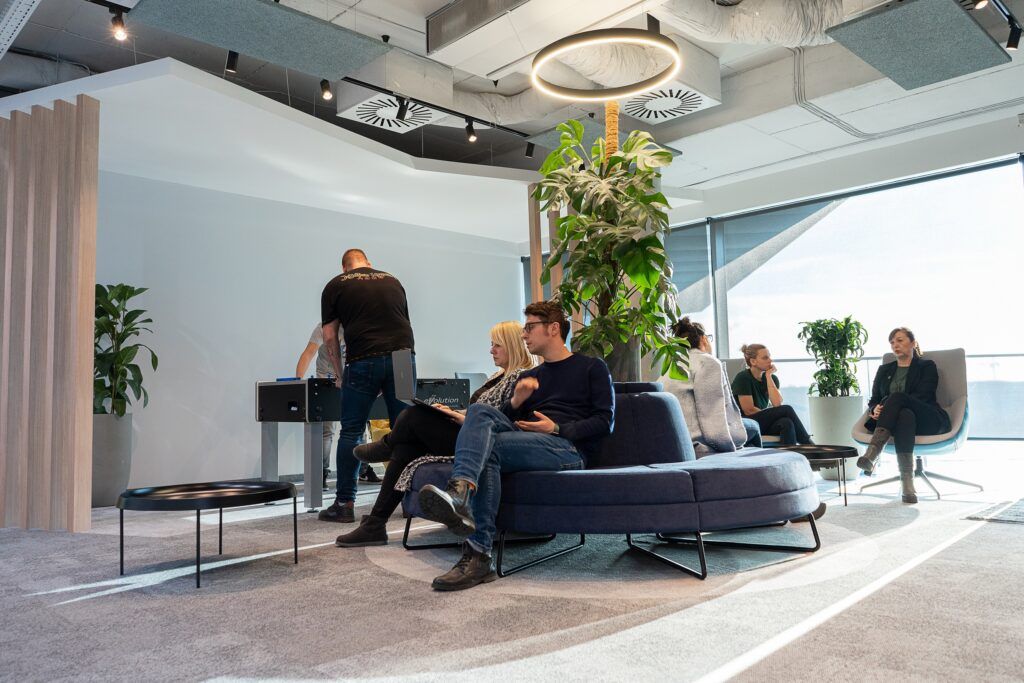

How To Scale Remote Engineering Teams: HTEC Group
04 December, 2023
Share this article
Table of Contents
Whether you run or work on a remote engineering team, chances are that you landed on this article looking to understand how scaling works.
While there are many challenges that come with scaling up any team, remote teams present their own unique set of particularities. Engineering teams as well. If we put these together, we get a whole new bunch of issues. Now, let’s take things systematically and learn how to navigate the waters of successful scaling.
What exactly does it mean to scale a team?
To scale a team means to increase revenue without proportionately raising team expenses. For obvious reasons, it is not an easy task, as it requires meticulous planning and methodical execution.
Scaling a team requires a tailored approach. It is important to first determine the reason for adding more members to your remote team. Is the organisation branching into new areas or expanding into new territories? Does it require specialised skills and expertise that are not currently present? Whatever the reason is, find it out and write it down. Start from there.
Now that you know “why” you need to add new talent to your expanding remote team, let’s focus on the challenges of scaling.
The main challenges of scaling
The perks of trusting your employees
Remote work is flexible, offering unparalleled freedom and a wide sense of autonomy. When you hire new people and plan to build a fully distributed team, you need to trust those who you work with. Trust must be mutual, of course, as they rely on you to foster their growth and offer them a secure place to work. You need to trust them that they are digging into those daily tasks while the engine keeps on running and the code flowing.
Keep things moving
Productivity drop-offs are generally a sensitive matter. Keeping an expanding technical team productive (and motivated) involves a lot of work, from choosing the right collaboration tools to managing code sprints. Lack of good team collaboration can lead to unclear objectives, poor planning and unsatisfactory deployment.
Keep the information flowing
Maintaining solid, long-lasting working relationships at all levels of a company requires effective and ongoing communication. Having regular calls and meetings can add clarity to tasks, as well as reduce the feeling of isolation. It is essential to foster a sense of community and connection within the team you work with. New members need to understand exactly what is expected of them and you need to constantly inform them about what’s new and what the priorities are. Additional tip: make your onboarding process super structured. First weeks in the company are critical, so pre-onboarding and internal processes need to be simple, smooth, effective – in other words, flawless.
A truly international ecosystem
When you hire remote devs and engineers, expect diversity within your new team. You access a wide range of global talent and that is wonderful because it makes collaboration more interesting. Layers of creativity are being added and with that, new perspectives.
Now that we’ve overlooked some of the general challenges companies face when dealing with scaling, let’s dig into some specifics. We’ll take HTEC Group as an example to untangle some of the most exciting aspects concerning scaling remote teams.
HTEC Group, the power of example
HTEC Group, a global company for the development of technologies and digital products, which has recently launched its operations in Romania, has been attracting the attention of the European and global business public for the past few years with its multiple growth and expansion into new territories.

The company increased its growth tenfold, from around 200 employees in 2020 to over 2,000 in 2022. Special emphasis is placed on the processes and internal organisation that have enabled the company to grow at this pace and employ up to 100 experienced software and hardware development engineers per month.
A lot of tactical planning and consideration were involved in the process.
Expanding the business in new countries does not come without challenges. It means understanding how laws and regulations work in those countries, taking into account time zones, culture differences and many other factors.
Once work-related regulations in a new country have been checked off the list, building and most importantly keeping a strong company culture together is essential. This culture translates into cultivating a sense of responsibility into employees and promoting a positive, values-infused culture.
In a remote-first setup, flexibility is key. Flexibility implies working from anywhere they feel comfortable, whether we are talking about home, office, coffee shop, coworking space or the beach. It is the sense of freedom and autonomy that makes hybrid and remote work environments so attractive. When dealing with distributed teams of engineers, it is the only way, in fact.
We know for sure that isolation feels a bit intense when working remotely. To encourage social interaction and to bring everyone together, HTEC Group relies on periodic gatherings, team buildings and technical events.
Technical events in particular (such as Codecamp where the company was present) represent an excellent opportunity to immerse into a unique universe with distinctive values and to mobilise core groups of people to work together towards a common goal: that of offering a glimpse into the company culture, of highlighting solutions or products and the technology behind, etc., to external audiences.
The ultimate goal is to create a strong reputation on the market in order to make the company more attractive to top candidates.
The aspect that contributed substantially to the success of scaling was the fact the teams are being organised within HTEC Group. The systematic distribution of authority throughout the organisation’s management tiers helped with efficiency because decision-making happens now faster, being closer to the problems that may arise.
Being an employer that offers equal opportunities to everyone across the organisation is helping a lot with the company’s reputation and its positioning on the market, in general. An environment where diversity and cultural differences are embraced is an environment that fosters inclusiveness, a sense of community and acceptance. In addition, it broadens the opportunities, opening up to wider audiences, giving the company the chance to perfectly match the candidate with the job.

Scaling can bring numerous benefits and future growth. As the team grows, the organisation is better equipped to take on larger projects and tackle more complex challenges, which can lead to greater success in the long run. From increased productivity and improved quality of work, to a more positive work environment, it is an important aspect of business growth.
HTEC Group went through all the stages in an accelerated mode, managing to scale its team of engineers ten times in just two years.
If scaling is something you plan to do within your distributed organisation, you might want to well check some of our previously written articles on how to manage remote teams and how to grow your remote team.
Keep up to date with our most recent articles, events and all that Pluria has to offer you.
By subscribing to the newsletter you agree with the privacy policy.

Whether you run or work on a remote engineering team, chances are that you landed on this article looking to understand how scaling works.
While there are many challenges that come with scaling up any [...]
04 December, 2023

I grab my coffee from the nearest Starbucks then I plunge into the maze of the hilly streets of the city, looking for some of the most exciting coworking spaces and coffee shops.
I’m t[...]
04 December, 2023